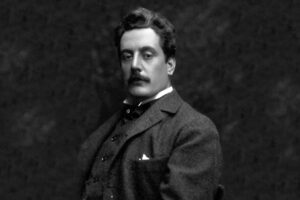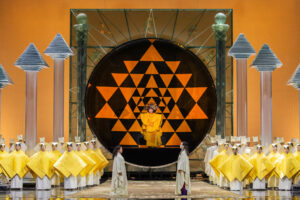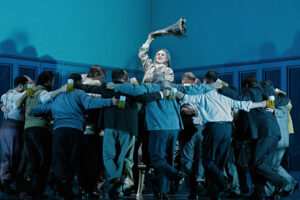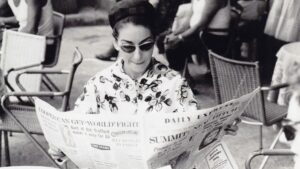

One sits through the performance undistracted by expectation. You don’t know what the composer has in store for you, or when he will play his cards, or what explosions lie ready to be detonated by the proper singer, the proper production, the proper zeitgeist.
And so I went to the Wiener Volksoper for Alfredo Catalani’s La Wally, a work renowned (as much as it can be said to be renowned) for “Ebben? Ne andrò lontana” (that aria from Diva, y’know) at the end of Act I, and for little else. Catalani died quite young, long and fondly remembered by his buddy Arturo Toscanini, who conducted the premiere and named two of his three children for characters in the opera.
Catalani’s brilliance as an orchestrator, if not quite so anarchic as Arrigo Boito’s, is justly remembered, and the intermezzo (every opera of the post-Verdi era was expected to have an intermezzo, to prove that Italians could change scenes just as vividly as the Germans could) can be thrilling if played with color and distinction .
This, indeed, occurred at the Volksoper by their branch of the Staatsoper Orchestra, suavely led by Frank Piollet, musicians more likely to be heard in Carl Millocker’s Bettelstudent or Frank Loesser’s Wie man Karriere macht, ohne sich anzustrengen.
La Wally was given, as is the Volksoper’s usual habit, in German translation. The opera puzzled me the last time I saw it (fifty years ago with some dame named Tebaldi) in putting characters named Gellner and Hagenbach in an Italian opera.
Doing it in German fixed that problem. Some auditors might miss the grace of the Italian linguistic line in such very Italian music, but I was very happy with everything but the one singer who could not seem to make her instrument achieve the transition from Germanic training to Italian flow.
One does not, these days, expect Tebaldi or Claudia Muzio or even Wilhelmenia Wiggins Fernandez, but “Ebben? Ne andro” is the sort of aria that only achieves its point if it is sung with buckets of sound hurling those phrases over Alpine crevasses with an elemental sorrow.
Kari Postma is a handsome woman and an excellent actress, and one sympathized with her portrayal of the haughty self-destructive heroine, but she did not make us ache for her sorrows. The voice kept to the pinnacles, the surface of the vocal line; it did not plumb depths to back them up. It was a sketch for a verismo heroine, not the achievement of one.
The rest of the cast were largely excellent. One thing to report is that the score contains more of interest and appeal than that one aria – a tune that comes back as a leitmotiv, of course, but not a leitmotiv beaten into the ground, as Cilea, for one example, would have done.
If you have a good tenor, as at the Volksoper with slim, curly-haired Vincent Schirrmacher, with many a sweet, purling phrase, you will take more than a little delight in the seduction duet of Act II, when Hagenbach and Wally fall in love on the dance floor.
Schirrmacher was first rate, too, in the long final scene when he climbs the mountain to the shack to which Wally has retreated – only to have her perish in an avalanche before they can be united, rather like Tristan awaiting a possibly hallucinatory Isolde (which I daresay was Catalani’s inspiration).
In this production, and I’m not sure how much this was librettist Luigi Illica’s idea or a brainstorm of the director, Aron Stiehl, Wally is going mad from solitude and despair, and Hagenbach, an apparition in white (every costume in the production had hitherto been some shade of gray, from dove to charcoal), is singing the adoring words any lonely lover would crave.

A word on the plot for those unfamiliar with the story: Wally is the strong-willed heiress of an Alpine honcho. Her father, sung by grand old Kurt Rydl, sounding grand … and very old, has decided to secure the succession to his property by forcing his daughter to marry his steward, Gellner (baritone Morten Frank Larsen), who adores her and has excellent intentions. But he’s stout and unattractive (he wears glasses!) and he’s a meddler.
The opera relates a series of misunderstandings that are taken too far by several passionate people unable to say they’re sorry. Wally refuses to marry Gellner and he refuses to give her up. Therefore she abandons her father and takes to the mountains (singing “Ebben? Ne andrò” as she climbs – which is probably great for building lung strength), her only companion a youth named Walter whom no one ever seems to suspect she might take as a lover.
Yes! You guessed it! Walter’s a trouser soprano! Beate Ritter did the honors, not too incredibly, with a yodeling aria about a girl who died in an avalanche and became the Edelweiss. But she had no trills.
Dad dies, Wally inherits, and she treats the villagers with hauteur. She will dance with none of these small-town goatherds. But Hagenbach, a smart-mouthed bear-hunter from down the valley who is engaged to a local girl named Afra (sung by tall Martina Mikelic, a sexy actress with an alluring, Dalila-level mezzo – the quartet for Afra, Walter, Hagenbach and a bass is another number worthy of more hearings), comes to the dance and makes a bet that he can not only take Wally out on the floor, he can get her to let him kiss her.
The swirling turntable-within-another-turntable set by Frank Philipp Schlossman, covered with abstract spotted cubes and triangles to make a very convincing Alpine landscape, is also just the place for the game of hunt-and-pursuit that ends with Wally indeed yielding a kiss to Hagenbach. By this time he’s genuinely in love (to the point that Wally insults Afra) and has forgotten the bet with the boys.
They haven’t forgotten, however. Wally, affronted by their laughter, asks Gellner to kill Hagenbach. He attempts to do so. Hagenbach, shot, falls into a ravine. Wally, of all people, climbs down and brings him back. I couldn’t imagine how that scene could be staged, but Mr. Stiehl and Mr. Schlossman, happily, could – and it worked.
Wally, depressed by the way her life is going, moves to Vienna to consult a rising Jewish psychologist. No, she doesn’t, but that would have been reasonable and Franziska Jacobsen‘s handsome gray costumes of the proper era would have made it opportune.
Instead Wally gives her property to Afra, renounces love and life and society, and goes back to the mountains, where Act IV finds her in a shack in rags, kicking Walter, her last friend, out of her life. There is nothing left. Then she hears a long-forgotten voice, and a figure in white ambles over the peaks ….
There is one more matter, the figure in a charcoal-grey trench coat sung by Daniel Ohlenschlager in a very imposing bass and acted with chilling authority. But who was he? He parts the curtains, summons the conductor, snaps his fingers to make the set revolve.
He looks meaningfully at a girl singing hymns and she topples over, dead. He impersonates various small figures in the drama, the infantryman who informs Gellner that Hagenbach is out hunting, the fourth part in the lovely Act II quartet. He arrives at the end to obscure our view of whatever hysterical Wally and angelic Hagenbach are up to behind the hut. He ends the show. He was very good. But what was he?
The only thing missing from this fine performance was a genuine spinto with oodles of Italian sound. But find me such a soprano today, eh? No reason to miss out on La Wally just because we haven’t got one.
Photos: Barbara Pálffy/Volksoper Wien

























Comments